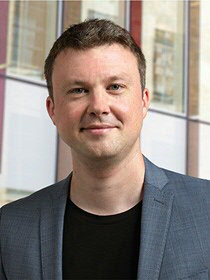What environment created life on earth? Dr. Tim Lichtenberg receives prestigious fellowship
Dr. Tim Lichtenberg has been selected for the Branco Weiss Fellowship, a program for outstanding postdoctoral researchers hosted by ETH Zurich. Lichtenberg now enjoys up to five years of academic freedom to perform his interdisciplinary research at any institution in the world. He chose the Faculty of Science and Engineering (FSE) of the University of Groningen.
The Branco Weiss Fellowship – Society in Science has selected Dr. Tim Lichtenberg as one of nine new fellows after a global recruitment campaign. As of October 1, Lichtenberg will be a researcher at the Kapteyn Astronomical Institute (FSE), University of Groningen.

In his research, Lichtenberg will explore the coupled evolution of highly molten planetary states of exoplanets and the chemistry of forming exoplanetary atmospheres. With this, he aims to gain novel insights into the climate and surface geochemistry of the earliest Earth, and the plausible range of planetary environmental conditions conducive for the origins of life. Lichtenberg will establish a new research group for this.
Recently, Lichtenberg discovered that extrasolar planets – worlds circling around stars other than our Sun – can host vast quantities of water in their deep interiors that is hidden from astronomical observations. Due to the intense starlight that many of the currently known exoplanets receive on their surfaces, their interiors can be molten magma instead of solid rock, as we are used to on Earth. New evidence points to worlds that harbour several thousand times the total volume of Earth’s oceans of water – hinting to the interior as an important reservoir of atmospheric build-up on rocky, potentially Earth-like worlds.
Branco Weiss Fellowship
The Branco Weiss Fellowship offers an opportunity for postdocs in all areas of the natural and social sciences as well as engineering who have conceived an original and independent research idea that falls outside the scope of large-scale research projects. This year’s new fellows come from a wide range of research fields including astronomy, biology, biochemistry, biotechnology, computer science, epigenetics, geophysics, medicine, neuroscience, physics, sciences of religions, and virology.
| Last modified: | 03 October 2022 10.46 a.m. |
More news
-
13 May 2024
‘The colourful cells of petals never get boring!’
Most people will enjoy colours in nature. However, the interest of evolutionary biologist Casper van der Kooi goes much further: he studies how flowers, birds, butterflies, and beetles get their colours. He also studies how these colours are used...
-
13 May 2024
Trapping molecules
In his laboratory, physicist Steven Hoekstra is building an experimental set-up made of two parts: one that produces barium fluoride molecules, and a second part that traps the molecules and brings them to an almost complete standstill so they can...
-
07 May 2024
Lecture with soon to be Honorary Doctor Gerrit Hiemstra on May 24
In celebration of his honorary doctorate, FSE has invited Hiemstra to give a lecture entitled ‘Science, let's talk about it’ on the morning of 24 May
